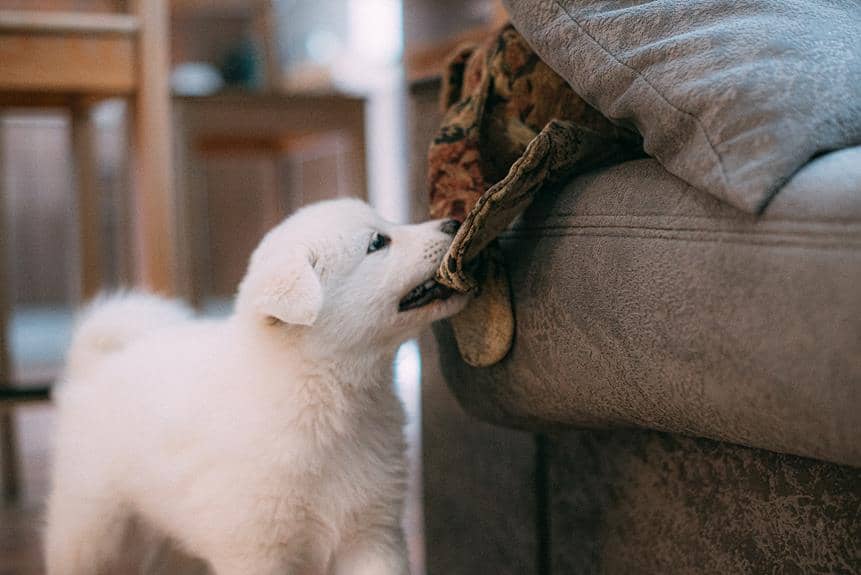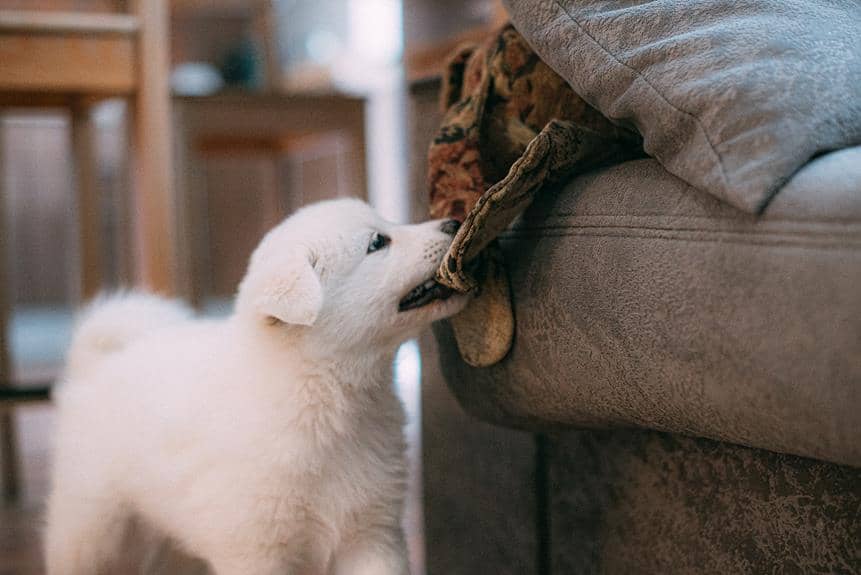
We all know the feeling – those sharp little teeth sinking into our skin as we play with our adorable puppies.
But Is puppies biting normal? In this article, we’ll delve into the reasons behind puppies biting and explore the different stages of their development.
We’ll also discuss when biting becomes a concern and provide practical strategies to manage and redirect this behavior.
Table of Contents
The Reasons Behind Puppies Biting Behavior
We’re discussing the reasons behind puppies’ biting behavior. Puppies, like human babies, explore the world through their mouths. It’s a natural instinct for them to use their sharp little teeth to investigate objects and interact with their environment. Additionally, puppies may bite to alleviate the discomfort of teething. Just like human babies, puppies undergo a teething phase where their baby teeth are replaced by adult teeth. This can cause discomfort and itching in their gums, leading them to chew and bite on anything they can find to relieve the pain.
Another reason behind puppies’ biting behavior is their playfulness. Puppies are full of energy and playfulness; biting is one way to engage in play. They might nip at their siblings or even at their owners during playtime. This behavior is entirely normal, but teaching them appropriate biting inhibition is essential so they learn not to bite too hard.
Lastly, puppies may bite as a form of communication. When puppies interact with their littermates or owners, they might use gentle bites to convey their needs or get attention. Understanding their body language and responding accordingly is crucial to avoid misunderstandings.
Understanding the Developmental Stages of Puppy Biting
As we explore the developmental stages of puppy biting, it’s essential to understand the reasons behind this behavior and how to address it.
Puppies, like human babies, go through different stages of development as they grow. One of these stages involves biting, an entirely normal behavior for puppies. During this stage, puppies explore the world around them using their mouths. They may also bite as a way to relieve teething discomfort. However, as pet owners, we must teach our puppies appropriate behavior and discourage excessive biting.
To address puppy biting, we can start by providing our puppies with appropriate chew toys and redirecting their biting behavior toward these toys. This helps satisfy their natural urge to chew and teaches them what’s acceptable to bite. It’s also important to socialize our puppies with other dogs and people to help them learn bite inhibition. If a puppy bites too hard during play, their playmate will yelp or stop playing, teaching the puppy that biting too hard isn’t acceptable.
In addition to these strategies, consistent positive reinforcement training and patience are essential. It’s vital to be consistent in our expectations and reward our puppies for good behavior. With time and proper guidance, our puppies will learn to control their biting instincts and become well-behaved adult dogs.
When Does Puppy Biting Become a Concern
Puppy biting becomes a concern when it starts to cause injury or becomes aggressive. As new puppy owners, we were initially prepared for our little bundle of joy to explore the world with their mouth. We understood that puppies use biting as a way to learn and play. However, we quickly realized there’s a fine line between normal puppy behavior and when it becomes a cause for concern.
In the early stages, puppy biting is usually harmless and can be managed through proper training and socialization. Puppies explore their environment by mouthing objects, playing, and biting with their littermates. It’s essential to their development and helps them learn bite inhibition. But as our puppies grow, their biting may become stronger and more intense.
When puppy biting starts causing injury, such as breaking the skin or leaving bruises, it’s crucial to address the issue promptly. Aggressive biting, where the puppy is growling, lunging, or showing other signs of aggression, is also a significant concern. This type of biting can indicate underlying behavioral problems or fear.
We must seek professional help, such as consulting a veterinarian or a professional dog trainer if we notice our puppies’ biting becoming a concern. They can help us understand the underlying causes and provide us with practical strategies to manage and redirect this behavior. Remember, addressing puppy biting early can prevent it from escalating into a more severe problem.
Practical Strategies to Manage and Redirect Puppy Biting
How can we effectively manage and redirect our puppies’ biting behavior?
Dealing with a puppy’s biting can be frustrating and challenging, but with the right strategies, teaching them appropriate behavior is possible.
One effective method is redirecting their attention and providing suitable alternatives to chew on. By offering a variety of safe and engaging chew toys, we can encourage them to turn their biting behavior toward these appropriate objects.
Additionally, it’s crucial to establish clear boundaries and consistently enforce them. This could involve using a firm ‘no’ and immediately withdrawing attention when they bite. Consistency is vital in helping them understand that biting isn’t acceptable.
Another technique is positive reinforcement. When our puppies display good behavior and refrain from biting, we should praise and reward them with treats or affection. This reinforces their understanding of what’s expected from them.
Finally, seeking professional help from a dog trainer or behaviorist can provide valuable guidance and support in managing our puppies’ biting behavior.
We can effectively manage and redirect our puppies’ biting behavior with patience, consistency, and the right strategies.
A Guide to Teaching Bite Inhibition and Proper Chewing Habits
We’ve found that using a variety of chew toys and consistently enforcing boundaries is effective in teaching our puppies proper chewing habits. Providing them with a range of appropriate chew toys, such as rubber bones or puzzle toys, gives them an outlet for their natural chewing instincts. This helps redirect their attention away from destructive chewing behaviors, like chewing on furniture or shoes.
Consistently enforcing boundaries is also crucial in teaching puppies proper chewing habits. Establishing clear rules and boundaries helps them understand what’s acceptable to chew on and what’s not. By redirecting their attention to their chew toys whenever they start chewing on something inappropriate, we reinforce the idea that chewing on their toys is the correct behavior.
To engage the audience further, we’ve two sub-lists:
Tips for choosing chew toys:
- Look for toys specifically designed for puppies and made of safe and durable materials.
- Consider the size and texture of the toy to ensure it’s appropriate for your puppy’s age and breed.
Strategies for enforcing boundaries:
- Use positive reinforcement by praising and rewarding your puppy when they chew on their toys instead of inappropriate objects.
- Consistently redirect their attention to their chew toys and remove tempting items from their reach.
Frequently Asked Questions
How Long Does Puppy Biting Typically Last?
Puppy biting is a normal behavior that usually lasts until they are 4-6 months old. During this time, they are exploring their environment and teething. Proper training and redirection can help minimize biting.
Are Certain Dog Breeds More Prone to Biting Than Others?
Certain dog breeds may exhibit a higher tendency for biting, but it’s important to remember that training and socialization play a significant role. We must consider individual temperament and experiences to determine a dog’s propensity for biting.
Can Puppy Biting Be a Sign of Aggression?
Puppy biting can be a sign of aggression, but it is usually a normal behavior in young dogs. However, it is essential to redirect their biting toward appropriate toys and provide proper training to discourage aggressive behaviors.
Is It Normal for Puppies to Bite During Playtime?
During playtime, puppies may bite to explore and learn boundaries. It’s crucial to redirect their behavior toward appropriate chew toys. Consistent training and positive reinforcement will help them grow out of this phase.
What Should I Do if My Puppy’s Biting Is Causing Harm or Injury?
If our puppy’s biting is causing harm or injury, we must take immediate action. We should redirect their attention to appropriate chew toys, use positive reinforcement training, and seek professional help.
Conclusion
In conclusion, while puppies biting can be a regular part of their development, addressing this behavior early on is essential.
We can guide them towards proper behavior by understanding the reasons behind their biting and implementing effective strategies, such as teaching bite inhibition and redirecting their chewing habits.
Like a sculptor shapes clay, we can shape our puppies into well-behaved and gentle companions.








Leave a Reply
You must be logged in to post a comment.